By Onur Sinan Güzaltan
French President Emmanuel Macron has advocated in various statements at different times for the creation of an independent European pole that is distant from the US, opposed to Russia and cooperating with China.
To understand and evaluate Macron’s statements, it is useful to put the pieces back together, which were displaced with the Ukraine War. First, let me underline the fact that the Ukraine War was instigated by the Anglo-Saxon front. This instigation has three main goals:

First objective: “European Civil War”
China defines the Ukraine War as the European Civil War. A definition that correctly identifies the aim of those who instigated the War…
By the Ukraine War, the Anglo-Saxon front aimed to create a battlefield between Russia and Europe and to sever the relations between the two.
The most straightforward evidence of this strategy on the ground is the blowing up of the Nord Stream pipeline by Anglo-Saxon intelligence agencies. With this sabotage, the idea of Europe-Asia integration that could extend “from the Atlantic to the Urals”, as expressed by De Gaulle, was also targeted. The aim was double-sided: Keeping Europe under the umbrella of the US on the one hand and isolating and weakening Russia economically, politically, and culturally deprived of the connection with Europe.
Second objective: Preventing China’s access to Europe
Immediately before and after the start of the war, all the officials I met in Russia stated that the long-term target was China, while the short-term target was Russia. The deteriorating relations and economic data between Europe and China after the Ukraine War prove them right.
The aim here is again double-sided: Preventing China’s access to Europe by destabilizing Eurasia, which is as a bridge between China and Europe, and forestalling Europe forming an alternative to the US economically.
Third objective: Maintaining the West-East equation
With the Ukraine War, Europe weakened due to deteriorating Europe-Russia and Europe-China relations and thus became more deeply dependent on the “West” camp led by the US. Meanwhile, a strong anti-Russian propaganda reminiscent of the Cold War has been launched directed at the European peoples.
The aim is to maintain the equation based on the West-East contradiction, thus preventing European-Asian integration.
In light of the facts mentioned above, Macron has made statements about a united European pole independent of the US, Russia and China. But how realistic is it with Macron’s perspective?
Let’s search for an answer with a simple question: How can Europe, which is continuing its dispute with Russia, taking part in American embargoes on Iran and rejecting to establish equal relations with Türkiye which plays a strategic role in terms of energy routes, meet its energy needs?
Some may answer as Africa. However, we observe that European powers, primarily France, have lost many countries on the continent, including Mali, Niger, Senegal, Burkina Faso and Algeria, to Russia, China and Türkiye.
Therefore, the possibility of France or other European countries becoming influential in Africa through initiatives like Françafrique is low.
In Macron’s perspective, Europe, which closes its doors to resources in Eurasia and is about to lose the game in Africa, has only one place to appeal to: the United States of America…
So, how will Europe, which has become dependent on the US for energy, manage to distance itself from it? We don’t see any concrete answer in Macron’s project. Resources to be discovered in the Arctic and energy deposits in Norway could be brought up here, but in these areas, the influence of many major powers, especially the Anglo-Saxons, continues.
And another question is how will Europe in Macron’s perspective curb the rising nationalist movements in Europe?
Le Pen’s National Front, AfD and others… They are the second-largest parties in their countries and are steadily getting stronger. It’s not likely that Macron could create a European pole by ignoring these parties and their voters.
Another topic: Migration
For now, Europe is trying to prevent migration to itself by giving concessions, as in the examples of Türkiye and Egypt. However, neither Türkiye nor Egypt have the economic or social infrastructure to sustain this migration for a long time. Does Europe have any project to handle waves of migration when these countries begin to fail?
Isn’t the security vacuum in Paris and Berlin and the inadequacy of law enforcement already an indicator that Europe has already lost this war?
Another point:
Macron talks about developing relations with China. So, through what trade routes will Europe establish relations with China while antagonizing forces in Eurasia? Do maritime routes suffice for this significant trade volume? Do naval forces in Europe have adequate capabilities for possible security problems in international waters?
Considering the current state of Europe, it’s not difficult to raise more questions.
What’s easier is to determine that Macron’s “European pole” which antagonizes Eurasia will only accelerate Europe’s trajectory towards a new Middle Ages.
Of course, some are going to characterize Macron’s statements as Europe’s rebellion against the US, but such evaluations are hollow. It’s obvious that Europe, which has turned its back on Eurasia, cannot rebel against the US.
Macron’s statements point to the following reality: The collapse of the West under US leadership has prompted even a banker like Macron to seek another path within his limited horizon.

















Leave a Reply